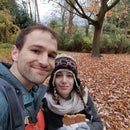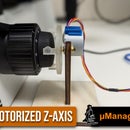Introduction: Laser Cut Sewing Box (Gridfinity Compatible)
In this short instructable, I'll show you how to make a laser cut sewing box. The inspiration for this project came following a recent post about a large sewing box, which I absolutely loved. Problem was, Wouterr made it with too much precision and hard work for me repeat- I'm not that talented! So I set out to make a laser cut version, the quick and easy way to get things done ;) To make the box somewhat upgrade-able and universal, I designed it to fit the gridfinity standard, but that's 100% optional.
If you prefer watching a short narrated video of the project, this is for you:
I hope you follow along and enjoy this project, and if you have any questions or comments, I'll be happy to reply!
Supplies
- 6mm and 3mm Birch plywood sheets.
- PLA for the hinges (or 16 M5 screens + nuts and 32 washers).
Step 1: 3D Printing
Print the washers and hinges (STL's are attached below). I used PLA. You'll need 16 hinges and 32 washers, but since some of the hinges may break during assembly, you might want to print a few extra.
Step 2: Find the Right Laser Settings
Other than just cutting, you'll also need to be able to engrave 1mm-deep indentations in the wood. These will help hide the hinges within the wood, so that they're flush (which is essential if you want the box to fit gridfinity trays). Here's how to get the right settings:
- Draw a few circles in your laser engraving software, and use the 'Fill' mode (1st image).
- Try different settings until the discs you're engraving are approximately 1mm deep. A good initial guess would be to make the laser 6 times faster than what you set to cut 6mm.
- Use a 3D printed washer (from the previous step) to make sure the indentations are deep enough (3rd image).
Step 3: Laser Cutting
It's time to cut :) I attached the SVG files below. Black lines mark where you're supposed to cut, and orange are meant to be set to "fill" to make the indentations (see previous step). In the "Cover" file there's a blue line, which you should engrave onto the wood (see step 8 for more details).
The primary structure (the upper and lower compartments) should be cut out of 6mm wood, while the cover & support arms are designed to be 3mm. You'll need to cut 2 copies of the upper compartment, 1 of the bottom 2 covers, and 8 support arms. If you want to use Gridfinity trays with this box, you should also cut the "gridfinity base" file out of 3mm wood.
Don't forget to set the kerf offset! I'm using a 0.08x0.08 mm^2 laser beam, and I set the kerf offset to 0.09mm. The exact value I use really depends on the type wood I'm cutting. I set the kerf offset to 0.08-0.1mm depending on how soft the wood is.
Step 4: Assemble the Lower Compartment
Let's begin with the assembly.
- Lay the pieces of the lower compartment on a flat surface.
- Make sure that the indentations are pointing inwards (1st image).
- Connect the outer faces to each other (2nd image).
- Attach the bottom plate. You may need to apply a little bit of force here, and a rubber hammer can be helpful (3rd image).
- If the pieces are loose, consider using a bit of glue.
Step 5: Add a Gridfinity Layout (optional)
If you want to add a gridfinity layout, now is the time. You only need to add it to the bottom compartment, because the dimensions of the upper ones match those of a 3x3 gridfinity tray exactly (this can't be done for the bottom compartment and the top at the same time!).
- Spread some glue over the gridfinity layout.
- Place it in the bottom compartment.
- Make sure it's centered, leaving 6mm from either of the side walls. I did this by inserting a 6mm piece of plywood between the gridfinity layout and one of the side faces (see 2nd GIF).
Step 6: Assemble the Upper Compartments
Assemble the upper compartments. This is just a repeat of step 4 :)
- Assemble the outer faces, with the indentations pointing inwards.
- Attach the bottom plate with a little bit of force.
Step 7: Attach the Support Arms
If you want to paint your box, it's best to do so prior to this step.
Now that all 3 compartments are assembled, we can connect them together.
Each connection goes like this (first image):
- Insert one of hinges from the inside out.
- Slide a washer over from the outside, until you hear a click.
- Attach a support arm
- Slide another washer to tighten everything.
It's best to attach all 8 support arms to the bottom compartment first (2nd image), and only then to attach them to the upper compartments (3rd image)
Step 8: Assemble the Top Cover
The last piece we need to assemble is the top cover. It's made of two parts, the cover itself, and a thin frame. The files I attached.
- Apply some glue to the thin frame (1st image)
- The frame and the cover should be centered. To make sure that's the case I engraved some light marks on the cover (see 2nd image).
- Lay the thin frame over the light marks (3rd & 4th images).
- Clean up the excess glue.
Step 9: Sand the Box
Sand the box, and round it's edges. I used 100, 200 and 400 grit sand paper (starting from 100, then 200 and finally 400).
Step 10: Add Gridfinity Trays
It's time to add gridfinity trays or whatever you like. I attached the ones I used, which are all 3x3 in gridfinity units, with different heights (each height unit equals 7mm). These were all generated using Jamie's OpenSCAD generator. You can also find a ton of other designs on Printables.com and such, or better yet, design some on your own :)
For the gridfinity trays to fit in, the indentations (step 2) must be (at least) 1mm deep.
Attachments
Step 11: Enjoy!
That's all! I'm using this box for my electronics, but it could fit other tools, sewing material or even jewerly. There's really no limit of what to do with this box with a little bit of imagination. I hope this project inspires you to make something of your own! And if you end up making a box like this, I'd love to see your version in the "I Made It" section below :) Also -
If you like my instructable and want to see more like it,
you're welcome to visit my collection of laser-cutting projects
And if you want to support my work (for free), visit my YouTube channel, see if you like what I've done so far, and consider subscribing! See you soon :)















